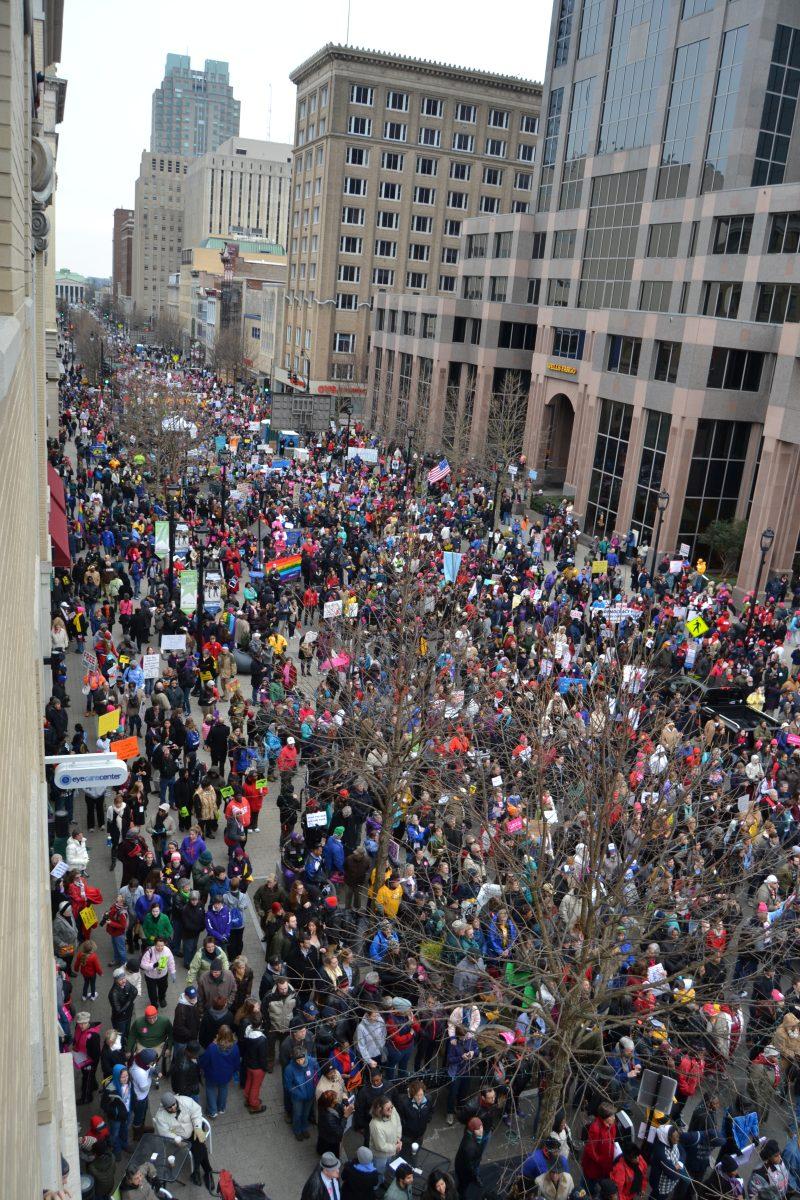Tens of thousands of people marched through downtown Raleigh to express their discontent with policies implemented by Gov. Pat McCrory and the N.C. General Assembly Saturday.
Rev. William Barber II, president of the N.C. Chapter of the NAACP, and members of 150 other advocacy groups participated in the Historic Thousands on Jones Street “Mass Moral March” to protest policies partaining to voter ID, Medicaid expansion, cuts to education, women’s reproductive rights, LGBT rights and fracking.
Though the City of Raleigh permit was only for 20,000 attendees, the march, which began at Shaw University is estimated to have drawn between 80,000 and 100,000 people, according to the N.C. NAACP.
“We return to Raleigh with a renewed strength and a new sense of urgency,” Barber said.
Barber said students are important to what he called a “movement for social justice,” and without their support, marches such as the one that occurred on Saturday would not have continued, no would they carry the same power.
Barber encouraged students to continue to mobilize by pledging their commitment to becoming more involved.
“We will become the ‘trumpet of conscience’ that Rev. Dr. Martin Luther King Jr. called upon us to be, echoing the God of our mothers and fathers in the faith,” Barber said. “Now is the time. Here is the place. We are the people. And we will be heard.”
Lauryn Collier, president of the N.C. State NAACP chapter, said she was amazed because HKonJ was comparable to the other movements in the 60s because people are fighting for the same rights as they were 50 years ago.
“We were in awe of how many people came out to the march and the diversity of people fighting for the same issues,” Collier said. “One of the conversations we had out there was how a movement like the moral march truly defines diversity.”
Student groups came from across the state as well, such as Youth Against Rape Culture of Chapel Hill, East Carolina University’s College Democrats, NC HEAT, and Manpower Development Corp of Durham, an education and labor advocacy group.
Ivanna Gonzales of MRDC and recent graduate of UNC-Chapel Hill joined a handful of other students who shared the stage with Barber. There they outlined why they joined the march and have been leaders in mobilizing students for several others.
“I am a proud Latina immigrant,” Gonzales said. “I will not rest until all people are welcome.” Gonzales spoke about the rights of immigrants and her displeasure with some of the state’s leadership.
Jessica Holmes, a native of Pender County and attorney of the North Carolina Association of Educators, spoke against what she called the legislators’ “war on public schools.”
Holmes said without the public school system, she would not be where she is today and wants future generations to have access to better education.
John Lucas Frye, a sophomore in international studies, marched with N.C. Student Power Union, an education-advocacy organization. Frye said his reasons for attending stem from a controversial comment Gov. Pat McCrory made last year regarding liberal arts education.
“I’m here because of McCrory’s remarks about education, and if how you want to study women and gender studies or something else like that ‘you can go do that on your own time’,” Frye said. “It’s unfortunate and disrespectful to me.”
Frye, who said he has hopes of becoming an Arabic translator and interpreter when he graduates, said McCrory’s words are an insult not only to him, but also to other students who study the liberal arts.
Nicole Dozier, assistant project director of NC Justice’s Health Access Coalition said North Carolinians are frustrated with the refusal of Republican legislators to expand Medicaid in the state, but said she and others will continue to march until access to health care is expanded.








